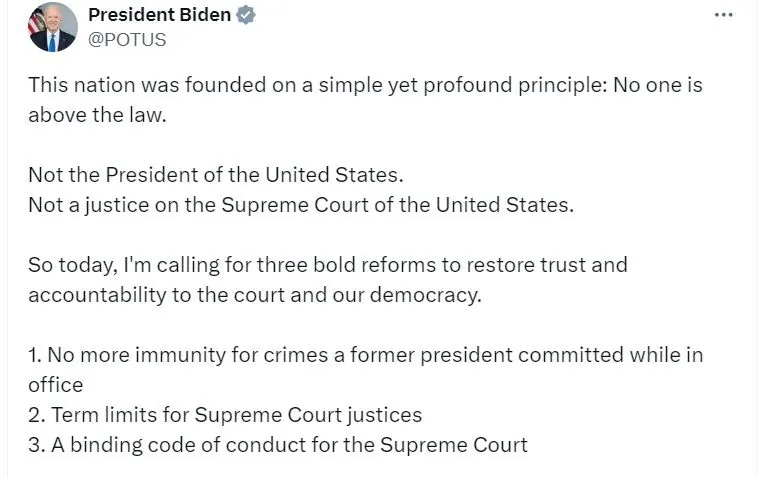Biden unveils plan to reform the Supreme Court and the immunity of the US president
Kyiv • UNN
Joe Biden has called for three reforms to restore trust in the judiciary and democracy. They include lifting the immunity of the ex-president, limiting the powers of judges, and a binding code of conduct for the Supreme Court.

Joe Biden supported the reform of the Supreme Court and the amendment to lift the immunity of the President of the United States for crimes committed while in office. Transmitted by UNN with reference to the page of US President Joe Biden on platform X.
Details
Today, I call for three bold reforms to restore trust and accountability in the judiciary and our democracy.

The U.S. President outlined a number of key reforms:
1. No more immunity for crimes committed by the former president while in office
2. Limitation of powers of judges of the Supreme Court
3. A binding code of conduct for the Supreme Court
Context
Mr. Biden's push for reform comes a week after the president finalized his re-election bid and endorsed Vice President Kamala Harris to face Republican presidential candidate Donald Trump in November.
Here's what the Washington Post has to say about the US president's decision:
For Biden, who has long resisted calls to reform the Supreme Court, Monday's announcement marked a significant shift in his position on one of America's three branches of government.

The president will officially announce his support for the changes during a speech on the occasion of the 60th anniversary of the Civil Rights Act at the LBJ Presidential Library in Austin, WP notes.
Code of Conduct and Powers of Judges
Unlike other members of the federal judiciary, the U.S. Supreme Court justices, who are appointed for life, do not have a binding code of ethics.
They are subject to disclosure laws that require them to report income and certain gifts, although meals and other forms of “personal hospitality,” such as stays in a private residence, are generally not subject to declaration.
In November, the court adopted its first code. Critics say that the code of conduct does not go far enough, as it allows judges to decide whether to recuse themselves from cases and does not provide any enforcement mechanism.